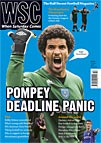 As a neutral watching English clubs playing in Europe, Adam Powley finds it difficult to get behind 'our' teams
As a neutral watching English clubs playing in Europe, Adam Powley finds it difficult to get behind 'our' teams
If there’s one thing to be certain of this season, it’s that at some point during the various European campaigns, the nation will be exhorted to “get behind the English teams”. There is an unwritten rule, adhered to in particular by the TV companies broadcasting the Champions League, that all English fans will by default support English clubs in European competition. English success is held to be “a great advert for the Premier League” and thus incontrovertible proof of the health of the game in this country.
Yet the opposite may just as well be true. There is no way of telling for certain what the wider football population thinks about English sides and Europe. But the odds are that if you had been in a pub last season to watch an English team in action, especially those in the Champions League, you would have seen plenty of viewers hoping they did not prevail. Fans of close rivals are excused on grounds of more pronounced partisanship, but it’s a lazy assumption to expect neutrals to fall into line.
And why should they? Despite the globalisation of the game, club football is still a largely parochial affair, at least for the supporters. Fans want their club to do well beyond anything else and the flip side is that they don’t want others to succeed. The concentration of success in a narrow elite with a virtual monopoly of the CL places is more likely to bolster rather than diminish that attitude. Success in Europe is good primarily for those clubs and not the wider game since it expands the wealth gap, concentrates playing talent among the Big Four, and lessens the chances of others catching up. Viewed in that context, the Big Four’s European dominance is something to criticise, not celebrate.
Furthermore, the clarion calls for national unity strike an odd note when the crude notions of what constitutes “Englishness” in a modern football context are considered. The Big Four are largely foreign owned, managed and staffed. Increasingly they are looking to foreign TV markets for their paying fanbase. Just about the only “English” aspect that remains is the support in the ground and even that may fade in importance as clubs seek to tap into overseas markets for their revenue via TV, tours and
merchandise.
Playing the nationalist football card has become a device to stimulate interest in predictable events that have lost their excitement. It wasn’t always like this. Back in the 1970s, getting behind English teams in Europe seemed like the natural thing to do, rather than a burden of duty. Aside from Derby and Notts County fans, most of the country surely wanted Nottingham Forest to do well. Having a charismatic manger no doubt helped, but cheering a small provincial club with a modest budget taking on the might of Europe and beating them was always going to be an easier sell than wanting Chelsea’s debt-supported venture to prosper now.
Even the big clubs of the time could rely on the goodwill of neutrals. I recall watching Liverpool take on Borussia Mönchengladbach in 1977 in a Spanish hotel TV room, cheering them on along with every other English holidaymaker while the German tourists reciprocated in their support for Mönchengladbach. The triumph of clubs from your own country was some-thing to admire, not resent and begrudge like it is today.
Some may wish Arsène Wenger’s self-proclaimed purist principles find their reward, but it is questionable that such success would be “good for the game” since Arsenal is a club that has speculated its heritage on the property market and corporate entertainment. Similarly, winning club football’s greatest prize would be a reward for risk and saddling famous clubs with huge debt, encapsulated in the business models of the Glazers, Hicks and Gillett, and Abramovich.
This season it’s in the Europa League where more deserving cases can be found. Everton resemble a “proper” club more than most and Villa, while bankrolled by a billionaire, aren’t exactly acting like a billionaire-owned club tends to do. Putting to one side the less appealing aspects of their owner, Fulham might be the most attractive proposition for patriotic neutrals. A small club with relatively limited resources, managed by a likable boss in the twilight of his career, they are arguably the club most deserving of the goodwill and support of neutral fans.
From WSC 272 October 2009